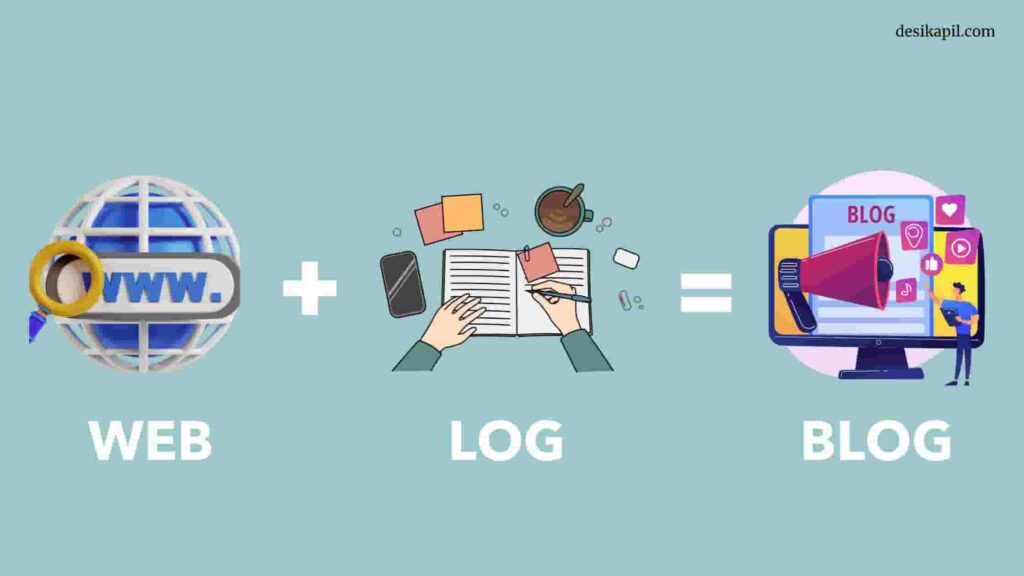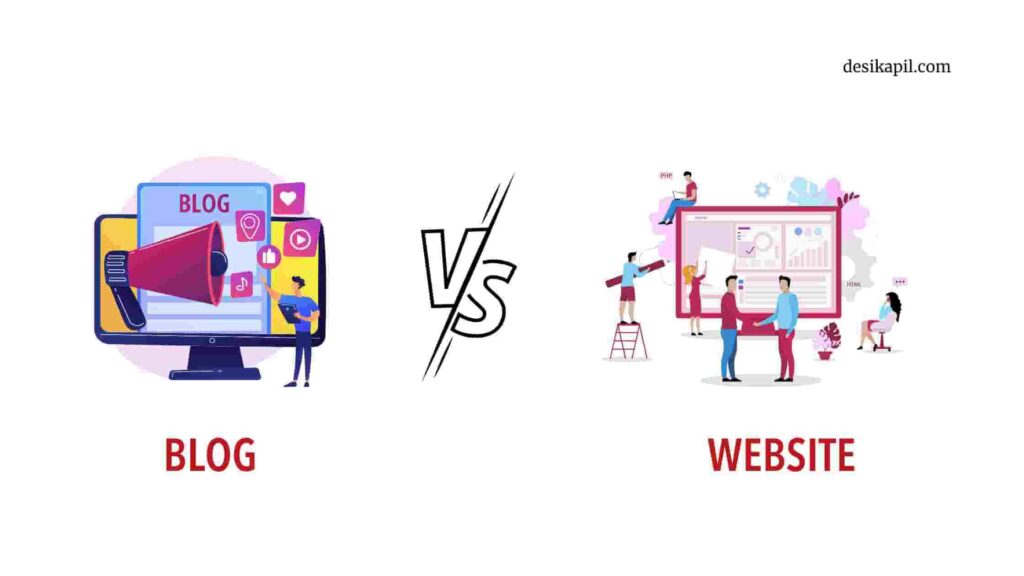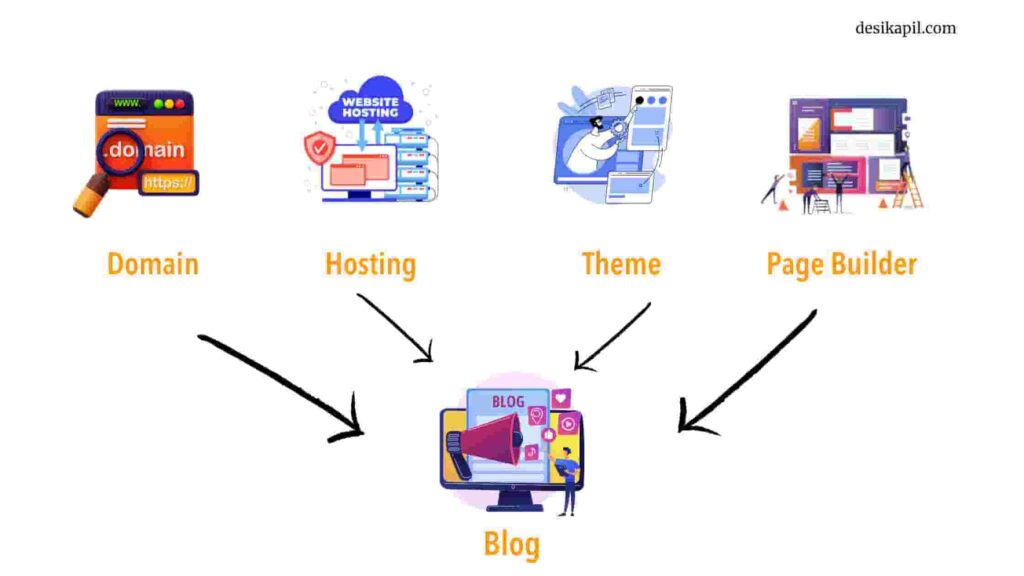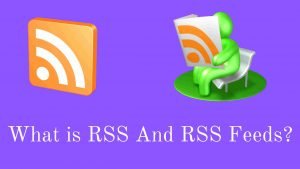Blogging has gained tremendous popularity in recent years, but there are still many misconceptions about it. In this comprehensive article, I will provide the complete A to Z guide on Blogging. You will learn what blogging is, how it works, different types of blogs, how to set up your blog, and strategies to monetize it. If you are a beginner blogger, I will also share valuable tips which can be of great benefit to you. Let’s get straight to the details!
Things you will Learn
What is a Blog?
A blog is essentially an online diary or journal hosted on a website. It is a platform where people called bloggers share their thoughts, experiences, and interests.

The term “blog” is derived from “weblog”, which refers to a series of content entries on a website. Some of the distinctive features of a blog are:
Blogs are arranged in reverse chronological order, with the latest posts appearing at the top.
Blogs are regularly updated with high frequency.
And generally revolve around specific industries or subject categories.
Blogs encourage interaction with viewers through comments and foster a sense of community.
Simply put, a blog is a dynamic and frequently updated website.
How Does a Blog Work?
A blog operates on a blogging platform, which simplifies the process of creating, publishing, and managing blog content. While coding can be used to create a blog, most bloggers prefer to use a Content Management System (CMS) for their ease of use. Popular CMS options include WordPress.com, WordPress.org, Blogger, Tumblr, Medium, Drupal, and Joomla. These platforms provide ready-made software solutions that do not require any technical knowledge or skills.
Difference Between Blog and Website

Although all blogs are websites, all websites are not blogs. Some of the major differences between blogs and websites are:
Blogs are frequently updated, while websites are often static.
and provide a wide range of content categories, while websites focus primarily on providing information about products or services.
Blogs promote discussion through comments, promoting reader engagement, whereas websites may not have a comment section.
Websites tend to have a more formal tone, focusing on conveying content, while blogs are more personal and interactive.
It is common to find established websites with a dedicated blog section to connect with their audience on a more personal level.
Can anyone start a blog?
Absolutely! Starting a blog does not require any coding knowledge or expertise. Platforms like WordPress make it incredibly easy for anyone to set up a blog with just a few clicks. Whether you are a grandparent or a young child, blogging is accessible to all. You do not need to be an expert in any particular field to start blogging; It is important to have an interest in and passion for your chosen subject.
What do you need to set up your own blog?
If you are a newbie and unsure where to start, I recommend signing up for a free plan on WordPress. With WordPress, you can focus on creating content while the platform handles the technical aspects. However, if you are serious about your blogging venture, you will eventually need the following:

Domain: A domain name is the address of your website. It is recommended to choose a memorable and relevant domain name. Many domain registrars offer affordable domain name options.
Web Hosting Service: A hosting service provides storage space for your website and provides tools for maintenance, security, backup, etc. Do research and select a reliable hosting provider that best suits your needs.
Theme: To make your blog attractive, choose a light and fast theme that supports customization and widgets. Popular themes like GeneratePress and Astra are excellent options.
Page Builder: A page builder plugin simplifies the process of easily designing professional-looking pages. Popular page builders include Elementor, Beaver Builder, Divi Builder, and Thrive Architect.
Before proceeding make sure that you have a clear understanding of domain and hosting concepts.
What are the benefits of blogging?

There are many reasons why you should start a blog. Some of the key benefits include:
Platform for Sharing Ideas: Blogging provides a venue to share your ideas, expertise, and information while organizing it in a central location.
Skill development: Blogging helps to hone writing skills and other talents, making you an expert in your field.
Community Engagement: Through blogging, you can connect with like-minded individuals who share your interests and passions.
Enhanced Search Ranking: Blogging can improve the search ranking of a business or website. Companies use blogs to attract more traffic and generate leads, while non-profit organizations use blogs to raise awareness of their cause.
Build Trust and Branding: Blogging allows you to build up a loyal and trustworthy following that believes in your brand and expertise.
Monetization Opportunities: Through blogging, you can monetize your blog by selling products/services, displaying ads, offering online courses, providing consulting services, or through sponsored posts.
Blog Basic Structure
Although modern blogs may have different widgets and sections, the basic structure remains consistent. A blog usually includes the following elements:
Header: The header contains the navigation bar, which provides links to important pages, categories, or services on the blog.
Content Area: This section displays blog posts in reverse chronological order, with the most recent posts at the top.
Sidebar: The sidebar to the left or right of the main content can contain additional information such as recent posts, comments, author profiles, email subscription forms, etc.
Footer: The footer displayed at the bottom of the blog is visible on all pages and includes legal information, copyright notices, privacy policy, contact details, etc.
type of blog
When choosing a topic for your blog, there is no restriction. However, focusing on specific categories can help attract a dedicated audience. Here are some common types of blogs:
Personal Blog: Personal blogs revolve around the life, daily events, and thoughts of the blogger. They are mainly focused on connecting people with similar interests.
Company Blog: Company blogs are created by businesses to provide information about their products and services. They help establish brand authority and connect with customers.
Business Blog: Business blogs target a specific area or topic to attract potential customers. They generate revenue by offering products and services.
Business Blogs: Business bloggers aim to generate income from their blogs through various monetization techniques such as advertising, affiliate marketing, and sponsored posts.
Education Blog: Educational blogs act as online resources, providing information and curriculum to students or learners.
Niche Blog: Niche blogs focus on specific topics or interests with a specific audience in mind. They are effective in quickly building a devoted readership.
How to earn money from your blog?
There are many ways to monetize and generate income from your blog. Some popular methods include:
Displaying Ads: You can earn revenue by displaying ads on your blog using platforms like Google AdSense or by partnering with ad networks.
Selling Online Courses: If you have expertise in a particular field, you can create and sell online courses through your blog.
Affiliate Marketing: By promoting other people’s products or services on your blog and earning a commission for each sale or referral, you can generate income through affiliate marketing.
Providing Consultancy Services: If you have special knowledge or skills, you can provide consultancy services to your blog audience.
Selling Products or Software: You can develop and sell your own products, merchandise, or software through your blog.
Sponsored Posts: Collaborating with brands and writing sponsored posts in return for compensation is another way to monetize your blog.
The choice of monetization method depends on your topic and audience.
blogging tips for beginners
If you are new to blogging, here are some valuable tips to consider:
Choose the Right Blogging Platform: Opt for a reliable and user-friendly platform like WordPress, which powers a significant portion of websites globally.
Define your target audience: Clearly identify your target audience based on your chosen sector to create content tailored to them.
Provide Valuable Content: Focus on creating informative and engaging content that adds value to your readers’ lives.
Maintain a consistent posting schedule: Publish new blog posts regularly to keep your audience engaged and attract new visitors.
Optimize Your Blog: Use SEO techniques and plugins to optimize your blog for better search engine visibility and user experience.
By following these tips, you can increase your chances of building a successful blog with a dedicated readership.
In conclusion, this article has provided a comprehensive overview of blogging ranging from definition and functionality to its benefits, types, and monetization strategies. Whether you’re a beginner or looking to improve your existing blog, these insights will help you navigate the blogging world more effectively. If you found this article useful and would like to receive more valuable content, subscribe to my newsletter. Thanks for reading, and enjoy blogging!

![You are currently viewing What is Blogging & How Does It Work? Blogging Explained [A-Z]](https://www.desikapil.com/wp-content/uploads/2023/07/Blue-Pastel-Creative-Fun-Blogging-Blog-Banner-min-1.jpg)
